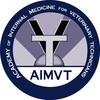Guidelines for Mentees
- Mentees (aka applicants or candidates) shall be qualified to sit for the AIMVT examination within the following year or the next available exam. (in other words a applicant cannot utilize a mentor if they will not be qualified to take the examination for 2 years or more)
- Mentees may - on their own - recruit more than one mentor if desired. AIMVT will only assign one mentor to each candidate.
- Mentees shall be financially responsible for any travel, lodging, or per diem necessary to meet with a mentor.
- Mentees will only have a mentor(s) in the specialty in which they have applied. (e.g. no Cardio mentors for SAIM applicants or vice versa)
- Mentees cannot use mentor time to complete the skills list or other requirements of application.
- Having an AIMVT mentor does NOT guarantee an application will pass the review process, or that a candidate will pass the certifying exam.
Guidelines for Mentors
- Mentors shall be members of AIMVT in good standing and hold a VTS. (charter members cannot be mentors except in special circumstances)
- Mentors cannot receive financial compensation for their time.
- Information mentors may share is limited to:
- Guidance as to what types of cases are acceptable for the case log and ways to incorporate the advanced skills list into case logs.
- Guidance as to what types of cases are suitable for Case Reports. Case Reports need not be unusual cases, but may include commonly seen disease problems that require advanced skills and nursing.
- Demonstration or instruction in diagnostic or therapeutic techniques
- Suggested reading material (may include books, book chapters, or peer reviewed journal articles)
- The types of information that may appear on the examination (no indication of specific questions may be given to candidates)
- When reviewing Case Reports:
- Mentors may provide general information as to the completeness and thoroughness of the document.
- Mentors may give feedback such as “Case Report does not include generic names of medications” or “Case Report does not exhibit sufficient advanced skills” is acceptable feedback.
- Responses that indicate specific information are unacceptable.
- It is acceptable for the mentor to indicate if the candidate is “on the right track or not” without giving specific details.
- Mentors may suggest upcoming CE opportunities to the candidate to aid the candidate in meeting the CE requirement.
- Mentors may provide opportunities for the candidate to travel to their facilities to learn advanced skills or have skills verified. As stated above, costs associated with travel are at the expense of the mentee.
- Mentors may help guide study time with the candidate:
- Mentors may share with a candidate general test-taking techniques, calming techniques, and strategies for reducing test anxiety.
- Mentors may quiz mentees on the types of information that may appear on the examination.
- Mentors may answer specific questions posed by the applicant about the types of information that may appear on the examination.
- For example, a mentor can have a discussion about the pathophysiology of heart failure without indicating what specific information will be asked on the examination.
